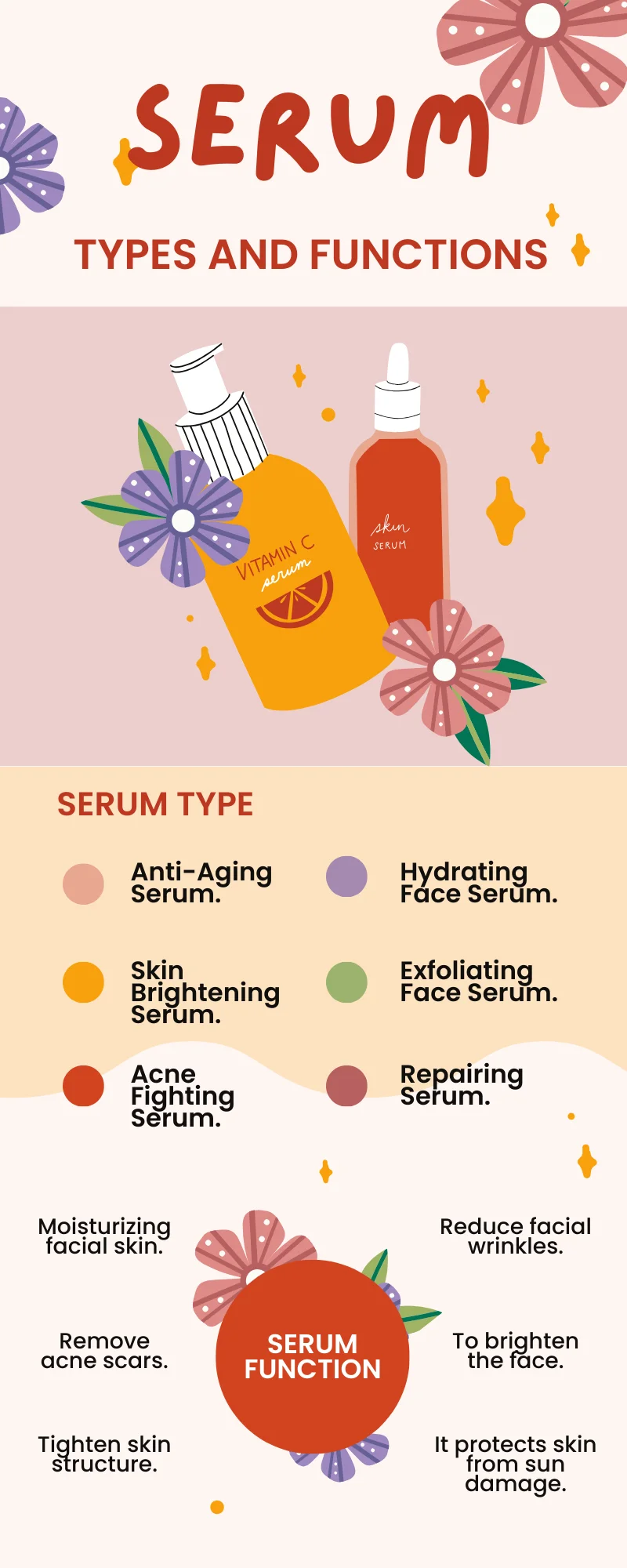Blog
Serum Types and Functions

The world of skincare can be overwhelming, with countless products promising a variety of results. If you’re curious about serums but don’t know where to start, this guide is for you.
Serums:
Serums are lightweight, concentrated formulas packed with powerful ingredients that target specific skin concerns. They’re designed to be applied after cleansing and toning, but before moisturizer. Since they’re so potent, a little goes a long way—just a few drops are enough to cover your face and neck.

Types of Serums:
There’s a serum for almost everything! Here are some common types:
Hydrating serums:
These contain humectants like hyaluronic acid, attracting and retaining moisture, ideal for dry or dehydrated skin.They’re great for dry or dehydrated skin.
Anti-aging serums:
These often contain retinol, vitamin C, or peptides, helping stimulate collagen production, reduce wrinkle appearance, and improve skin elasticity.
Brightening serums:
These contain ingredients like vitamin C, niacinamide, or kojic acid, helping fade hyperpigmentation and even out skin tone.
Acne-fighting serums:
These contain ingredients like salicylic acid or benzoyl peroxide, helping unclog pores and reduce breakouts.
Repairing serums:
These focus on soothing and restoring damaged skin. They may contain ingredients like ceramides, antioxidants, or centella asiatica, helping strengthen the skin barrier and promote healing.
Exfoliating serums:
These gently remove dead skin cells with chemical exfoliants like AHAs (glycolic acid) or BHAs (salicylic acid). They can help improve skin texture, reduce pore appearance, and boost radiance.
Choosing the Right Serum:
The best serum for you depends on your individual needs and skin type. Here are some tips:
- Consider your skin type: If you have dry skin, look for hydrating or repairing serums. If you have oily skin, focus on lightweight, oil-free options.
- Identify your concerns: Target specific issues with serums addressing them, like anti-aging, brightening, or acne-fighting.
- Research ingredients: Understand what’s in a serum and ensure it suits your skin. Consult a dermatologist if you have concerns.
Here’s a breakdown of the potential functions of the serum:
Moisturizing serums:
These serums contain ingredients like hyaluronic acid and glycerin, which act like water magnets, drawing moisture into the skin and keeping it plump and hydrated.Imagine them as giving your skin a long, refreshing drink
Wrinkle reduction:
Look for ingredients like retinol or vitamin C, which can stimulate collagen production and help reduce the appearance of fine lines and wrinkles.
Acne scar fading:
Certain serums containing ingredients like niacinamide or AHAs (glycolic acid) can help fade acne scars by promoting cell turnover and reducing hyperpigmentation.
Sun protection:
While some serums may contain antioxidants that offer some protection against environmental damage, they are not a substitute for sunscreen. It’s crucial to use a broad-spectrum sunscreen with SPF 30 or higher daily, even when using a serum.
Skin brightening:
Ingredients like vitamin C or kojic acid can help even out skin tone and brighten your complexion by reducing hyperpigmentation and dark spots
Tightening serums:
These serums may contain ingredients like peptides or retinol, which can help stimulate collagen production in the skin. Collagen is a protein that gives skin its structure and firmness.Think of them like encouraging your skin’s natural support system to get stronger
Patch test before you apply
No matter what type of serum you choose, it’s always a good idea to do a patch test first. Apply a small amount of the serum to your inner arm and wait 24 hours. If you don’t experience any redness, itching, or burning, the serum is probably safe to use on your face.
Remember, consistency is key:
It takes time to see the results of using a serum. Don’t get discouraged if you don’t see results overnight. Be patient and consistent with your application, and you’ll eventually see the benefits.
With so many great serums on the market, there’s no excuse not to give them a try. Just do your research, choose one that’s right for you, and be patient. You might just be surprised at the results!
I hope this article helps you learn more about the world of serums. If you have any questions, feel free to consult with a dermatologist or esthetician Remember, a qualified dermatologist or esthetician can offer personalized advice on choosing and using serums.
Please note that this is just a general guide, and it’s always important to consult with a healthcare professional before starting any new skincare regimen.
Derma.pk:
Derma.pk makes it easy! Chat with their team of experienced dermatologists directly through WhatsApp. Get personalized advice and recommendations, all from the comfort of your own phone
Blog.derma.pk is your insider guide to skincare success. Uncover expert tips, product hacks, and everything you need to achieve your skin goals, radiant lists, master product application, and say goodbye to confusion.
Contact details:
Backed by a team team of dermatologists available for consultations via WhatsApp. These
Categories
- Accessoreis
- Acne
- Aesthetic Procedures
- Anti Aging
- Author
- Baby Care
- Beauty
- Beauty & Cosmetics
- Blog
- Body Care
- cosmetic procedures
- Dandruff
- Dental Bonding
- Dental Care
- Dental Fillings
- Dental Health
- Dermatologist
- Dermatology
- Doctor
- Downloads
- Eye Care
- Food
- Food and Nutrition
- Hair Care
- Hair Loss Treatment
- Haircare
- Hand and foot care
- Health
- Health and Wellness
- Healthcare
- Imported Products
- Kids and baby care
- Laser Hair Removal
- Lip Care
- Medication
- Men's skin care
- Men's Skincare
- Nail Care
- Nutrition
- Oily Skin
- Online Consultation
- Oral Health
- Personal Care
- Pharmaceuticals
- Procedures
- Products and Ingredients
- scalp care
- Science
- Self care and wellness
- Shampoo
- Skin and Scalp Conditions
- Skin Care
- Skin Care and lifestyle
- Skin care myths and facts
- Skin Treatment
- Skincare
- skincare products
- Smile Design
- sunblocks
- Teeth Whitening
- wellness
- Whitening and brightening














